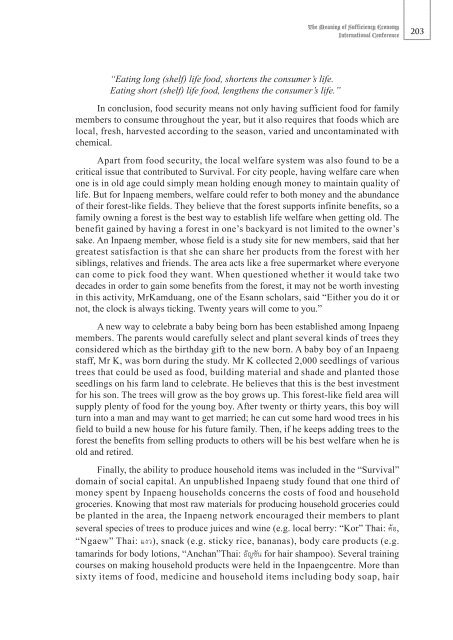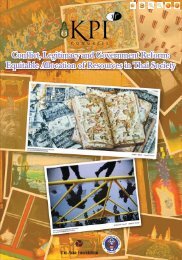SUFFiciENcy EcONOMy ANd GRASSROOtS DEvElOPMENt
SUFFiciENcy EcONOMy ANd GRASSROOtS DEvElOPMENt
SUFFiciENcy EcONOMy ANd GRASSROOtS DEvElOPMENt
Create successful ePaper yourself
Turn your PDF publications into a flip-book with our unique Google optimized e-Paper software.
The Meaning of Sufficiency Economy <br />
International Conference<br />
203<br />
“Eating long (shelf) life food, shortens the consumer’s life.<br />
Eating short (shelf) life food, lengthens the consumer’s life.”<br />
In conclusion, food security means not only having sufficient food for family<br />
members to consume throughout the year, but it also requires that foods which are<br />
local, fresh, harvested according to the season, varied and uncontaminated with<br />
chemical.<br />
Apart from food security, the local welfare system was also found to be a<br />
critical issue that contributed to Survival. For city people, having welfare care when<br />
one is in old age could simply mean holding enough money to maintain quality of<br />
life. But for Inpaeng members, welfare could refer to both money and the abundance<br />
of their forest-like fields. They believe that the forest supports infinite benefits, so a<br />
family owning a forest is the best way to establish life welfare when getting old. The<br />
benefit gained by having a forest in one’s backyard is not limited to the owner’s<br />
sake. An Inpaeng member, whose field is a study site for new members, said that her<br />
greatest satisfaction is that she can share her products from the forest with her<br />
siblings, relatives and friends. The area acts like a free supermarket where everyone<br />
can come to pick food they want. When questioned whether it would take two<br />
decades in order to gain some benefits from the forest, it may not be worth investing<br />
in this activity, MrKamduang, one of the Esann scholars, said “Either you do it or<br />
not, the clock is always ticking. Twenty years will come to you.” <br />
A new way to celebrate a baby being born has been established among Inpaeng<br />
members. The parents would carefully select and plant several kinds of trees they<br />
considered which as the birthday gift to the new born. A baby boy of an Inpaeng<br />
staff, Mr K, was born during the study. Mr K collected 2,000 seedlings of various<br />
trees that could be used as food, building material and shade and planted those<br />
seedlings on his farm land to celebrate. He believes that this is the best investment<br />
for his son. The trees will grow as the boy grows up. This forest-like field area will<br />
supply plenty of food for the young boy. After twenty or thirty years, this boy will<br />
turn into a man and may want to get married; he can cut some hard wood trees in his<br />
field to build a new house for his future family. Then, if he keeps adding trees to the<br />
forest the benefits from selling products to others will be his best welfare when he is<br />
old and retired.<br />
Finally, the ability to produce household items was included in the “Survival”<br />
domain of social capital. An unpublished Inpaeng study found that one third of<br />
money spent by Inpaeng households concerns the costs of food and household<br />
groceries. Knowing that most raw materials for producing household groceries could<br />
be planted in the area, the Inpaeng network encouraged their members to plant<br />
several species of trees to produce juices and wine (e.g. local berry: “Kor” Thai: ค้อ,<br />
“Ngaew” Thai: แงว), snack (e.g. sticky rice, bananas), body care products (e.g.<br />
tamarinds for body lotions, “Anchan”Thai: อัญชัน for hair shampoo). Several training<br />
courses on making household products were held in the Inpaengcentre. More than<br />
sixty items of food, medicine and household items including body soap, hair














